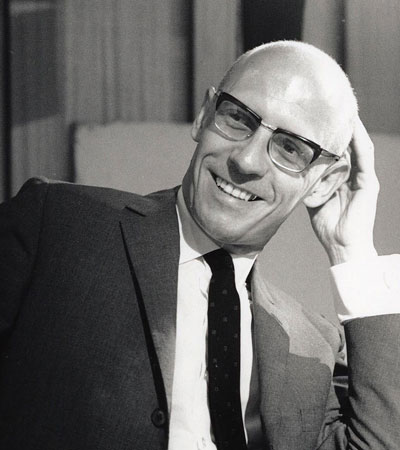
Biography
Michel Foucault was born Paul-Michel Foucault in the provincial town of Poitiers, France, in 1926. Both his father and grandfather were physicians and taught at the medical school in Poitiers. He was educated at two schools in his hometown and for a year at a Parisian lycée, where he first encountered the Hegelian scholar Jean Hyppolite. In Paris—on his second attempt, but with the fourth highest score in the nation on that second exam—he won entrance to the prestigious Ecole Normale Supérieure, a grande école tasked with training the French intellectual elite. Foucault studied philosophy under the Marxist Louis Althusser, among others, and excelled as a student.
Turning from philosophy (in which he was awarded a degree in 1948) toward the sciences, he also received a degree from the Ecole Normale in psychology, but failed the agrégation (the competitive examination normally taken in the third year of study) on his first attempt. After successfully retaking the exam, he taught classes part-time at the Ecole Normale before winning a scholarship to conduct research at the Fondation Thiers in Paris. He then took a further degree in psychopathology and gained practical experience working at the Sainte-Anne asylum, before spending two years teaching psychology at the University of Lille.
The Wandering Years
Foucault held many academic positions. From 1954–58, he taught in the Department of Romance Studies at the University of Uppsala and served as the director of the Maison de France cultural institute attached to the university. He then moved to the Center for French Civilization in Warsaw (1958–59). He was forced to leave this post because of his homosexuality, and he moved to the French Institute in Hamburg (1959–60).
In 1960, he began teaching psychology in the philosophy department at Clermont-Ferrand, where he stayed until 1966, while still living in Paris. In 1966, just as he was becoming a well-known intellectual figure, he spent two years in Tunisia teaching philosophy at the University of Tunis, living in the coastal village Sidi Bou Said.
Foucault then returned to Paris to chair the philosophy department at the newly created University of Vincennes. His time there was marked by the tail end of violent student protests and internal dissension.
Political Commitments
Foucault’s intellectual career is deeply marked by his responses to political events.
Poitiers was a destination for refugees during the Spanish Civil War, and within the zone of German occupation during World War Two. The war awakened Foucault to the problem of politics. He joined the Communist Party in the early 1950s, but left it after the fabricated “Doctors’ plot” in Moscow (1953) just prior to the death of Stalin. He was sympathetic to but not vocal about the Algerian struggle for independence.
The events of 1968, which he discussed during conversations with longtime companion Daniel Defert while Foucault was in Tunisia, coupled with the radical political commitments of his own Tunisian students, created what he called a “political opening.” The opening encouraged him to develop what he believed to be a more serious and radical criticism of politics than the French Intellectual Left had undertaken.
French prison revolts in 1971, and an April 1972 visit to Attica, the New York prison that had undergone a bloody revolt in September 1971, led him to become a spokesman for the Prison Information Group in 1971, and he was arrested multiple times for his activism. Foucault argued that one must “confront what one is thinking and saying with what one is doing.”
Collège de France and Berkeley Years
In 1970, Foucault achieved his greatest honor by being elected to France’s most prestigious academic appointment, the Collège de France. His chair in the History of Systems of Thought was newly created, replacing the chair in the History of Philosophical Thought held by Jean Hyppolite. Foucault gave yearly lecture courses and seminars. The lectures were intended to be a presentation of current research, and Foucault delivered them to a packed lecture hall of 300 and another overflow hall.
During the 1970s, Foucault also discovered America, Californian counter-culture, LSD, and the San Francisco gay community. In the last years of his life, he split his time between UC Berkeley, where he gave seminars in the Department of French, and the Collège de France. His wide travels included visits to Iran; he ultimately wrote for a variety of newspapers in defense of the Islamic Revolution.
On June 25, 1984, he died in Paris of a brain hemorrhage brought about by AIDS.
